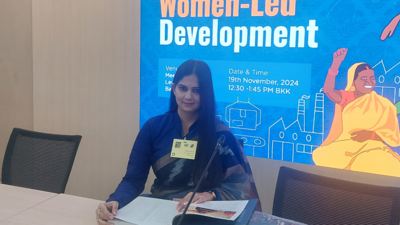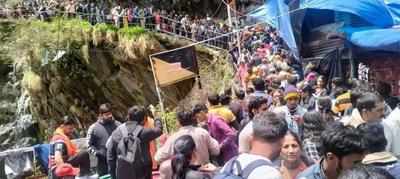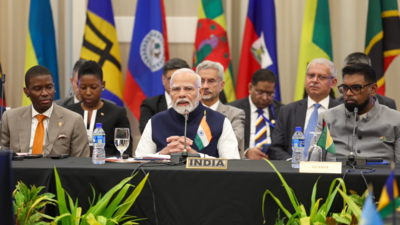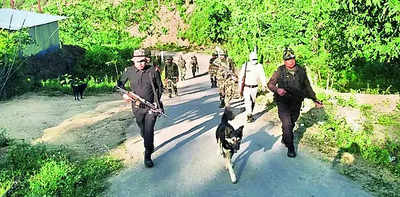
BANGKOK: 31-year-old Ankita Parmar , elected representative for nearly 88 villages from rural Gujarat, was India's voice from the grassroots on "women led development" at an event on the sidelines of the Asia - Pacific Ministerial Conference on the Beijing +30 review that started in Bangkok with member countries making statements about progress made towards achieving the goals and priority actions to support gender equality and women's empowerment. India showcased its work with self help groups (SHGs) to enable economic empowerment and how its panchayat leaders were trying to make a difference at the grassroots. Taluka panchayat president Parmar, for instance, has been leading the way on sustainable livelihoods by mobilising women of Por village in Vadodara to form SHGs to get the "Best From Waste" - a training project where they collect flowers and coconuts offerings, that would have been otherwise disposed of, from a famous local temple and make products like incense sticks and mats that people can use.
Ankita, daughter of a ‘sarpanch’, says that she is here to reinforce through her journey only one message - "if I can step out of my home and make a difference in a village other women too can do it." India in its country statement led by officials from the WCD ministry brought into focus the steps taken towards financial inclusion ranging from 1.4 million elected women representatives taking decisions at grassroots level political institutions to 100 million women steering change through SHGs.
The three-day conference organised by the United Nations Economic and Social Commission for Asia and the Pacific (ESCAP) and UN-Women is being held at the United Nations Conference Centre in Bangkok ahead of the 30th anniversary of the Beijing Declaration and Platform for Action that was adopted in 1995. The review brings together over 1,200 delegates from govts, civil society and youth groups, the private sector and academia to assess progress and deliberate on the challenges in the 12 critical areas of concern like poverty reduction, decent work, human capital development, freedom from gender based violence and gender responsive governance among others. Presenting the India statement, joint secretary from the WCD ministry, Preetam B Yashvant highlighted the strides made in the field of education and said that the country has achieved gender parity across all levels of education.
India has also emphasised its focus on bridging the gender pay gap, gender digital divide and better health, well-being and nutritional outcomes that were also reflected in the New Delhi Leaders’ Declaration under India’s G20 Presidency last year. The govt also shared that there has been an over 218% decadal increase in gender budgeting, with current year’s budgetary allocation worth USD 37 billion. Infact, the Asia Pacific Regional Report on Beijing +30 review released on the day of the opening of the conference highlights the gender budgeting being undertaken by India as an example.
It highlighted that gender responsive budgeting was introduced and institutionalised in 2005-06 by India to pave the way for allocation of resources based on the identified needs of women and girls..













